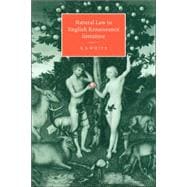
Note: Supplemental materials are not guaranteed with Rental or Used book purchases.
Purchase Benefits
What is included with this book?
| Preface | |
| Acknowledgements | |
| Natural Law in history and Renaissance literature | |
| The heritage of classical Natural Law | |
| The reception of Natural Law in Renaissance England | |
| Law and literature in sixteenth-century England | |
| More's Utopia | |
| 'Love is the fulfilling of the law': Arcadia and Love's Labour's Lost | |
| 'Hot temper leaps o'er a cold decree': The Merchant of Venice and Measure for Measure | |
| Shakespeare's The History of King Lear | |
| Milton and Natural Law | |
| Epilogue: Hobbes and the demise of classical Natural Law | |
| Appendix: Aquinas on the right to own private property | |
| Notes | |
| Select Bibliography | |
| Index | |
| Table of Contents provided by Publisher. All Rights Reserved. |
The New copy of this book will include any supplemental materials advertised. Please check the title of the book to determine if it should include any access cards, study guides, lab manuals, CDs, etc.
The Used, Rental and eBook copies of this book are not guaranteed to include any supplemental materials. Typically, only the book itself is included. This is true even if the title states it includes any access cards, study guides, lab manuals, CDs, etc.